英语口译基础教程unit 10-13
英汉汉英口译基础教程Unit 10 Trade Exchange II
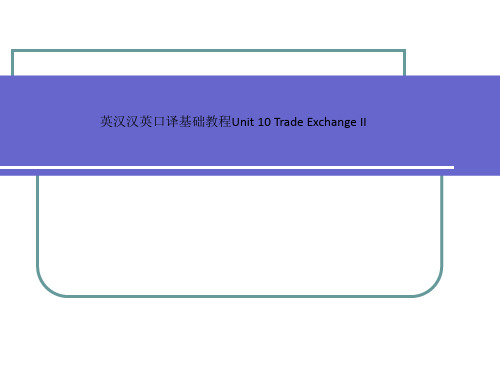
D. Pair Woerpretation
Text two Note-taking
我认为本次对话的主题“抓住经济全球化的机 遇和应对经济全球化的挑战”,既有战略高度, 又立足于现实的经济问题
围绕这一主题,会议将探讨应对经济全球化挑 战的政策措施、强化贸易诚信、加强在产品质 量和食品安全领域的合作
B. Group work: Reading and Discussion
What is the relationship between GATT and the WTO?
What do you know about the Doha Development Agenda (DDA)?
C. Group work: Four-cornered Dialogue Interpretation
E. Group Work: Sight Interpretation
Text Two Difficult Sentences 近年来,亚洲形势总体稳定,经济保持较快增长,各国坚持睦邻友
好、致力于通过对话协商处理矛盾和分歧的意识在增强,各种区域、 次区域合作机制在促进经济增长和地区稳定方面发挥着日益重要的 作用,亚洲仍然是世界上最具发展活力的地区之一。 Asia has in recent years enjoyed overall stability and fairly fast economic growth. To develop good neighborly relations and handle problems and differences through dialogue and consultation has gained increasing support among the Asian countries. The numerous Asian regional and sub-regional cooperation mechanisms are playing an increasingly important role in promoting economic growth and stability in Asia. Asia remains one of the world’s most dynamic regions.
口译基础
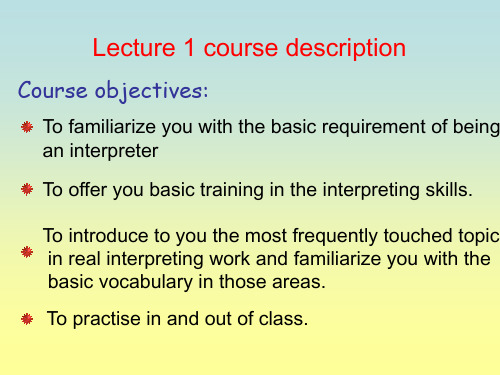
To practise in and out of class.
c 跨文化意识:口译是跨语言、跨文化的交际活动,其 最终目的是要让听众和讲话人达到思想文化的交流。
B 非智力因素
心理素质 身体素质 态度 责任心
IV. Brief History of Conference Interpreting
During the 1919 Paris Peace Conference, CI debuted officially.
II. Why to Be a Professional Interpreter?
4 Goods: Good places to visit Good food to eat Good money to make Good people to meet
III. 口译能力的构成:(Video)
A 智力因素
Textbooks for reference:
《口译基础》,邓轶主编,上海外语教育出版社 《英语口译基础教程》,仲伟合主编,高等教育出版社
Course plan:
Skill-based, topic-oriented
Theory explanation Skill-training Practice
Interpreting as a profession: the foundation of International Association of Conference Interpreters (AIIC) in 1953.
英语口译基础教程-Unit-1-Introduction
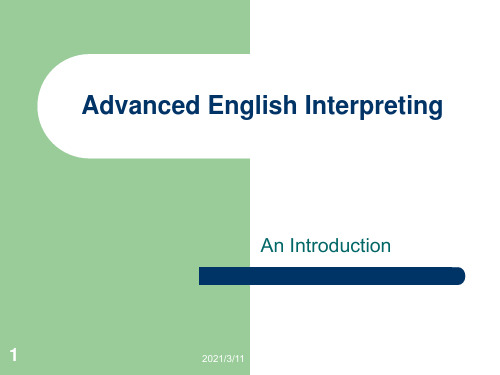
KI=KL+EK+S (P+AP) 译员应该掌握的知识 =双语知识+百科知识 +技能(职业 口译技能 +艺术表达技能 )
– KI=Knowledge Required for an Interpreter – KL=Knowledge for language – EK=Encyclopedic Knowledge – S (P+AP)=Professional Interpreting Skills and
By ways: one-way interpreting 单向口译 two-way interpreting 双向口译
9
2021/3/11
Types of interpreting
By contents: guide interpreting 导游口译 ceremony interpreting 礼仪口译 information interpreting 宣传口译 conference interpreting 会议口译 negotiation interpreting 谈判口译
美 经 中美合企 2年 I 说 dif@bus. man. 中← →美// we 更 直 率 比 中←不同文传// I x 我 bus. ++ 毕 有 + & - @both // 近年 美企exe. 强: hu 中管//
13
2021/3/11
Example 2: How do you interpret?
今晚,我们很高兴在北京大学再次接待我们的老朋友格林博士和夫人。 /我代表学校的全体师生员工向格林博士和夫人及其他新西兰贵宾表示热 烈的欢迎。//
我相信格林博士这次对我校的访问,必将为进一步加强两校的友好合 作关系作出重要的贡献。//
口译教程汉英翻译1—13单元译文
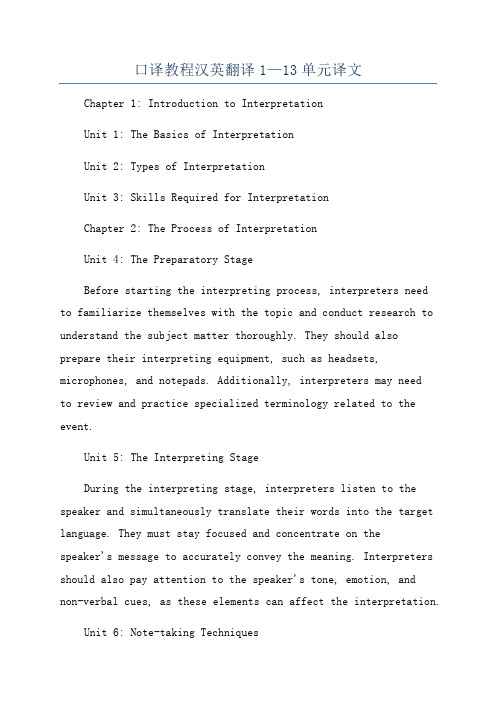
口译教程汉英翻译1—13单元译文Chapter 1: Introduction to InterpretationUnit 1: The Basics of InterpretationUnit 2: Types of InterpretationUnit 3: Skills Required for InterpretationChapter 2: The Process of InterpretationUnit 4: The Preparatory StageBefore starting the interpreting process, interpreters need to familiarize themselves with the topic and conduct research to understand the subject matter thoroughly. They should also prepare their interpreting equipment, such as headsets, microphones, and notepads. Additionally, interpreters may needto review and practice specialized terminology related to the event.Unit 5: The Interpreting StageDuring the interpreting stage, interpreters listen to the speaker and simultaneously translate their words into the target language. They must stay focused and concentrate on thespeaker's message to accurately convey the meaning. Interpreters should also pay attention to the speaker's tone, emotion, and non-verbal cues, as these elements can affect the interpretation.Unit 6: Note-taking TechniquesNote-taking is an essential skill for interpreters.Effective note-taking allows interpreters to retain important information and assist with memory recall during interpretation. Interpreters should develop their own note-taking system and use abbreviations and symbols to jot down key points quickly. However, note-taking should not interfere with active listening and immediate interpretation.Chapter 3: Consecutive InterpretationUnit 7: Introduction to Consecutive InterpretationConsecutive interpretation involves listening to one or several sentences in the source language and then reproducing them in the target language. It requires good memory retention and the ability to accurately convey the meaning. Interpreters should take notes and use their notes as a reference during the interpretation.Unit 8: The Techniques of Consecutive InterpretationInterpreters use several techniques during consecutive interpretation to ensure accurate and fluent delivery. These techniques include paraphrasing, summarizing, clarifying ambiguous statements, and maintaining natural rhythm and pacing. Interpreters should also adapt their interpretation style to match the speaker's tone and style.Unit 9: Consecutive Interpretation PracticeInterpreters can practice consecutive interpretation by engaging in role plays or shadowing experienced interpreters. They can also utilize practice materials, such as speeches, interviews, or articles, to improve their interpretation skills. Regular practice is essential for enhancing memory retention, improving fluency, and perfecting delivery.。
英语口译基础教程unit10-13
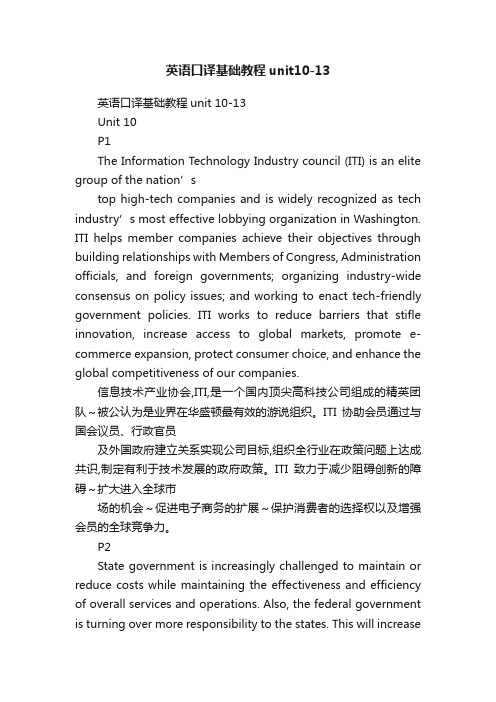
英语口译基础教程unit10-13英语口译基础教程unit 10-13Unit 10P1The Information T echnology Industry council (ITI) is an elite group of the nation’stop high-tech companies and is widely recognized as tech industry’s most effective lobbying organization in Washington. ITI helps member companies achieve their objectives through building relationships with Members of Congress, Administration officials, and foreign governments; organizing industry-wide consensus on policy issues; and working to enact tech-friendly government policies. ITI works to reduce barriers that stifle innovation, increase access to global markets, promote e-commerce expansion, protect consumer choice, and enhance the global competitiveness of our companies.信息技术产业协会,ITI,是一个国内顶尖高科技公司组成的精英团队~被公认为是业界在华盛顿最有效的游说组织。
ITI协助会员通过与国会议员、行政官员及外国政府建立关系实现公司目标,组织全行业在政策问题上达成共识,制定有利于技术发展的政府政策。
口译UNIT 10 第十单元教案

UNIT 10 第十单元Analysis of Passages语篇分析Unit Objective (单元目标)After reading this unit you should☆ understand cohnesion and connection.☆ master the techniques of descriptions and expression.Warm-up (准备)1. Two students are requested to sit at the Interpreting Desk or Booth, acting as interpreters of the class. Their performance is evaluated and graded by instructor.2. Instructor is to present a piece of news of the week.Theory of Interpretation X (口译理论十)Instructor is to explain the First part, “Reading Prelude” of Unit 10 of the textbook. Students have been asked to read this part before the class.1.语篇的两个基本特征:衔接和连贯衔接(Cohnesion):照应、省略和替代、连接词语、词汇衔接。
2.叙述类话语:基本特征、叙述功能。
Memoria Technica (记忆法)1. Listen to the following passage, and try to catch the key words and details, then retell them in your own words:Jane AustenJane Austen (1775-1817), a British novelist, famous for her witty studies of early-19th-century English society. She is also a prominent figure in British literature. She is gifted beyond words. Her novel Pride and Prejudice was once listed as one of the ten most famous novels in the world .//Jane was born on 16 December 1775, at her father‟s rectory at Steventon in Hampshire, the seventh in a family of eight children. Her father, George Austen, was a handsome, affectionate, sweet-tempered, firm character and ability to work hard.//Jane Austen‟s grandfather belonged to the middle class‟s lower levels: he was a Tonbridge surgeon, a comparatively poor man. Moreover, both of her grandparents died when her father was still a boy . //However, her father‟s education was paid by one of his rich uncles. Because of his hard-working, he earned his scholarship to St. John‟s College, Oxford. // He took orders as a priest in the Church of England in 1760; he returned to Kent to take up the job of second master at his old school. //Three years later he went back to his Oxford College as assistant Chaplain. In 1764, he married Cassandra Leign, Jane‟s grandmother then .//2. Students listen to the following passage once and reproduce the main idea and as many details as they can in English.Cost to Go to HarvardTo get into the top colleges like Harvard, Brown and Stanford, you need good grades, and even better SAT scores, right? Well, not if you happen to be the son or daughter of a wealthy donor or a celebrity. And there are some other back-door policies that may surprise you. Pulitzer prize winning journalist Daniel Golden wrote all about it in his new book "The Price of Admission : How America's Ruling Class Buys Its Way into Elite Colleges. Mr. Golden is the Deputy Bureau Chief in Boston for the Wall Street Journal, and he joins us now from that city.Thanks Dan for joining us.Thanks for having me.Un, now, we've heard about legacy applications all the time, you know, the, the kid of , you know, some /alumni of a college always get into the front of lines, so to speak, but you seem to be saying that it's worse than that, and more widespread than that? Knock it down for us.Yeah, the, the preference for the rich, err, children of the rich is not limited to alumni children. There is also a, a college admissions euphemism called "Development Preference," which is a preference for children of politicians or celebrities or corporate executives who you might ex, expect to give a lot of money if their children are accepted. Then, there‟s all the "Athlete Preferences" that favor kids that play blue-blood sports, you know, squash, sailing ,err, women's crew ,or men's crew, too, equestrian events, even Polo, err, athletes in those prep school sportsget, get preference as well.Err just to take the other side for a minute. Say I am a wealthy donor, I am not, but let's just say. (ok) I am, I am a wealthy donor, right, you know, my kid is, say, a B student, but you know, boy, I love my kid, I am a great parent, I am out there batting for my kid. You know, apparently, colleges pay, even though tuition is 30,000 dollars, the college actually pays 40,000 for a kid to really educate them. What's wrong with me giving, well I think a million dollars is the going rate, my kids get in and that money helps all the other students?Well, first of all , it's , it's, it‟s fundamentally unjust, I mean, these colleges are nonprofit. They're supposed to be err, educating the diamonds in the rough, and, and fulfilling goals of, you know, upward mobility and, and equal opportunity. So for every kid they allow in, like your son, the B-student, they're passing over 8 or 10A-students with tremendou s test scores who just don‟t have the money to pay up , so there is the unfairness there. The other thing is that, err, they can raise money in other ways besides, err, lowering their admission standards. Err, in my book, I document how Caltech and some other schools, they raise plenty of money, they have sizeable endowments, and yet, they don't use these preferences, they don't give an edge to alumni children, or children of corporate executives who can give them a lot of money. They assess students strictly on merit, and yet, they're able to raise money. So , it's not a, it's a false dilemma to say the only way they can raise money is by giving a break to ah, B or C students who happen to be rich.Is it really the case, Daniel, that president Bush's daughter Lauren applied the Princeton, sent the application in a month late, a month late, and was accepted? And I see my friends' kids applying to school ,they're sweating bullets, prep testing for SATs, begging, pleading , doing everything they can, trying to make themselves. And here she is, just sort of throwing it in a month late and getting in. That's outrageous.Yeah, that's right, I mean, she, she did apply late, and that's not an isolated instance, I mean, the, the children of the very rich and powerful, they have completely different admissions experience. Err, for example, they are much more likely to have an interview directly with the admissions dean, err rather than with a staffer. The president of university might show up to escort them around/ campus. Ah, if they are waitlisted, they often get preference taken over the way off / the waitlist. Harvard even has something called "the Z list" where it puts children of alumni and, and big donors where they are waitlisted, although sometimes they have assurance they‟ll be eventually accepted, and that at the end of the year after everybody goes home, and, and the rejected students can't complain any more,they‟re quietly accepted, not for that September, but the September after , after they take a gap year. So ,there's all kinds of mechanisms that colleges use systematically to favor, err, wealthy children.Ok, speaking of "the Z-list " at Harvard. You (Yes) went to Harvard.Yes, I did.Err, when …(Were you on the Z-list, Dan?)… Yeah, when did you getinterested in this school? Was there something at Harvard maybe that made you start thinking something was going on?Well, maybe to a certain extent it was in my subconscious when I was at Harvard because I was not a legacy or a kid of preference, I was not a member of the elite social clubs. So I noticed there was a world / I wasn‟t really a part of . But, it just, err, evolved, you know , years later , just a few years ago , for my reporting for the Wall Street Journal on the Michigan affirmative action case where, you know, white students were suing the University of Michigan saying , "Hey, we got rejected, and we should've been accepted, because we have better records than ah, black students who got in ". and I started looking at affirmative action for some of the privileged white students at, at Michigan and many other elite universities. (Hmm) And, err, we're running out of time here, but, I wanna get to, who gets hurt in this kind of, of process and situati on? I mean, we‟ve, we‟ve talked about various stratum...various ethnic groups. Who gets hurt in this?Well, the biggest victims are the kids who are not connected and particularly Asian-American students. I interviewed one young woman, Asian-American, got, you know, tremendous SAT scores, 15 something out of 1600 . I said "congratulations" and she said "no, no, we call that an Asian fail. If you don't have 1600 (Hmm) and you're Asian, (Hmm) you‟re not getting in the Ivy League …cause there‟s so many tremendous Asian-American candidates, and then also outstanding middle class and working class, err, white students who don't have a connection. You know, these colleges say, we take one out of ten, but if you don't have a connection, you put your odds probably one in 20, one in 30, one in 40. You know , it's a very uneven ,err, unfair system that they're, they're applying to.Stenography (口译笔记)实战操练一:Part 2 of the Unit 10, Exercise 1.实战操练二:Stenographic practice on the following speeches:肖建中,丽水学院党委书记:以发展为主题,以改革为动力,抓住机遇,开拓创新,把丽水学院建成具有较高办学水平、鲜明地、特色的本科院校,为浙江省特别是丽水市经济社会的跨越式发展作出新贡献。
口译unit10

In the East, people expect the boss to instruct and lead at all times, and staff will wait for that instruction and thus be heavily dependent on the boss. This means that people lower down the organization tend to take less initiative and ownership. This is a behaviour that might be viewed by some Western managers as avoiding responsibility.
A: 有人说, 一年一度的奥斯卡金像奖没什么 特别的,它只不过是一场游戏罢了。请问您怎 么看? B: To some extent, yes. It is a game, a grand happy game by Americans and in the American way. When it is finished, you needn't think about it any longer. It may benefit many people and boost their celebrity. For example, if an actor wins an Oscar, he or she will be able to sign five films the next year, each valued more than 10 million US dollars. All these are concrete things, but these aside, it is only a game, nothing special.
中级口译教程-梅德明-第三版-句子精炼 2-16单元(全)

句子精炼( Sentences in Focus )Unit 2 接待口译(机场迎宾、宾馆入住、宴会招待、参观访问)1. This is a fantastic airport, absolutely one of the top-notch international airports.(这个机场太美了,绝对是一个顶尖的国际机场。
)2. I’m very bad with a jet-lag. But I will be all right in a couple of days.(我倒时差很慢,但两天后自然就回复了。
)3. I’d like to have a 7 o’clock morning call, breakfast sent up to my room, laundry done, some documents photocopied, an express mail sent out, and something like that.(我要早上7点钟叫醒,早餐送到我房间,衣服要熨,文件要复印,邮件要快递,诸如此类的事情需要服务。
)4. We all maneuvered successfully to get our job done, so to speak.(可以说我们每个人都成功的使我们的使命得以完成。
)5. Let’s delight ourselves completely in the foods that Mother Nature grants us.(让我们尽情享受大自然赋予我们的食物吧。
)6. 我要是没认错的话,您一定是从伦敦来的泰莱科教授吧。
(You must be Prof. Tallack from London, if I’m not mistaken.)7. 我是海通集团人力资源部经理。
(I’m manager of Human Resources, the Haitong Group.)8. 感激您不辞辛劳,从百忙之中抽空来我公司指导。
- 1、下载文档前请自行甄别文档内容的完整性,平台不提供额外的编辑、内容补充、找答案等附加服务。
- 2、"仅部分预览"的文档,不可在线预览部分如存在完整性等问题,可反馈申请退款(可完整预览的文档不适用该条件!)。
- 3、如文档侵犯您的权益,请联系客服反馈,我们会尽快为您处理(人工客服工作时间:9:00-18:30)。
英语口译基础教程unit 10-13Unit 10P1The Information Technology Industry council (ITI) is an elite group of the nation’stop high-tech companies and is widely recognized as tech industry’s most effective lobbying organization in Washington. ITI helps member companies achieve their objectives through building relationships with Members of Congress, Administration officials, and foreign governments; organizing industry-wide consensus on policy issues; and working to enact tech-friendly government policies. ITI works to reduce barriers that stifle innovation, increase access to global markets, promote e-commerce expansion, protect consumer choice, and enhance the global competitiveness of our companies.信息技术产业协会,ITI,是一个国内顶尖高科技公司组成的精英团队~被公认为是业界在华盛顿最有效的游说组织。
ITI协助会员通过与国会议员、行政官员及外国政府建立关系实现公司目标,组织全行业在政策问题上达成共识,制定有利于技术发展的政府政策。
ITI致力于减少阻碍创新的障碍~扩大进入全球市场的机会~促进电子商务的扩展~保护消费者的选择权以及增强会员的全球竞争力。
P2State government is increasingly challenged to maintain or reduce costs while maintaining the effectiveness and efficiency of overall services and operations. Also, the federal government is turning over more responsibility to the states. This will increase the pressure to provide effective services and information technology will be an important part of meeting this responsibility. Today, information technology, with its potential to revolutionize the way we work, must be an integral part of any successful state government. Speed, efficiency, and accuracy in information exchange have become competitive tools to satisfy customer demands, improve productivity and enhance innovation and creativity.州政府正日益受到保持或减少成本的同时保证整体服务与运作的效能和效率的压力。
此外~联邦政府也将向各州政府移交更多的职责。
这将会进一步增加州政府提供高效服务的压力。
要担负这个责任~信息技术必不可少。
信息技术具有改革人类工作方式的潜力~必定是任何成功的州政府不可或缺的一部分~因为信息交流的速度、效率和准确性已成为满足客户需求、提高生产力、加强创新性和创造性颇有竞争力的工具。
P 3美国信息技术产业巨头EMC公司星期五宣布其将会在未来五年内向中国投资五亿美元~以更好的开发当地市场。
EMC是世界上最大的数据存储和信息管理解决方案的提供商~其主要竞争对手有康柏-惠普、IBM以及日立等。
该公司于10年前在北京设立一办事处~由此进入中国市场。
在2001---2005年间~EMC共在中国投资约1亿5000万美元。
U.S. information technology giant EMC Corp on Friday said it plansto invest US$500 million in china within five years to better tap into the local market. EMC, the world’s largest provider of data storage and information management solutions,competing with companies such as Hewlett-Packard, IBM and Hitachi, entered the China market 10 years ago by setting up an office in Beijing. Between 2001 and 2005, EMC invested about US$150 million in the country.P 4数字经济这一概念强调的是我们当前的经济收到了信息技术的巨大影响。
随着信息技术的发展~新的工作方式、通信手段、产品、服务以及社区陆续形成。
借助因特网~可直接在网上提供各种各样的服务等无形产品。
就有形产品而言~人们可首先在网上订购和签订合同~然后再将实物送达。
这样做生意可减少成本~提高服务质量~消费者也会从中受益。
The concept of digital economy is stressing that our economy is significantly influenced by information technology. New ways of working, new means of communication, new goods and new services, and new forms of community have come into being with the development of the digital technology or information technology. With the help of the internet, intangible products such as various services can be provided on line. As for tangible goods, people can order and contract through the Internet, and then get them delivered physically. By this way, business cost is reduced, the quality of services improved, and the consumers are benefited.Unit 11P1At Goldman Sachs our culture is very much in evidence helping us attract and ret ain the best employees and clients. Goldman Sachs’ commitment to its clients, teamwork, integrity, professional excellence and entrepreneurial spirit has its beginning in 1869 with Marcus Goldman. This spirit is embodied today in our core values of client focus, integrity, meritocracy, excellence, entrepreneurial spirit and teamwork. At the core of our business remains our commitment to our clients, which is embodied in our fourteen Business Principles. Our business principles are a consistent measure for evaluating recruits and employees.高盛公司卓越的企业文化帮助我们吸引并保留了最佳的雇员和客户。
从Marcus Goldman 先生于1869年创立高盛公司起~客户至上)团结合作)诚信守法)追求完美和开拓进取的企业精神就一直植根于高盛文化之中。
我们对客户做出的承诺是公司一切业务的核心~这一精神在高盛14条业务准则中充分体现。
高盛在招聘员工以及雇员进行业绩评估的过程中~始终以这些商业原则为准绳。
P2We should be flexible in engaging in varied types of trade, striving to maintain and develop the existing markets in the United States, European countries and Japan. We should strive to import advanced technologies and key equipment and increase the import of resource products. We should further deepen the reform of the foreign trade system and encourage overseas investment that can promote exports. Weshould continue to improve the domestic investment environment and maintain a steady increase in foreign investment.我们要灵活运用多种贸易方式~努力保持和扩大美)欧)日等传统市场。
